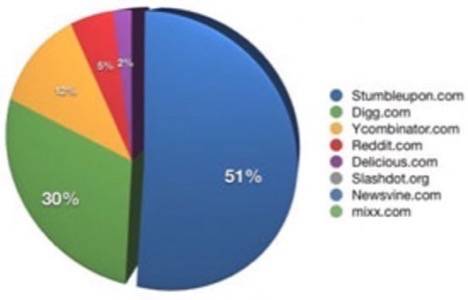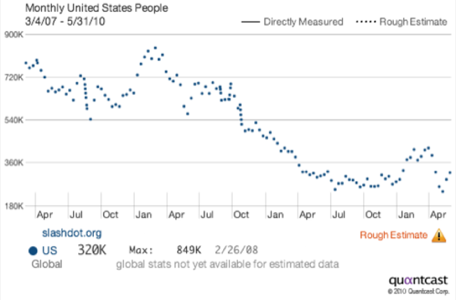Earlier today we published an analysis of the top traffic drivers in social media, based on data from Web analytics company Woopra. The biggest traffic driver was StumbleUpon (51%), followed by Digg (30%), Hacker News (12%) and Reddit (5%). Surprisingly, tech news community Slashdot was not in the list of top referrers. In fact, according to Woopra CEO John Pozadzides, Slashdot “drives close to 0% of traffic to the sites Woopra measures.” (emphasis ours)

Why is Slashdot almost irrelevant to the social media community? It used to be the biggest driver of traffic to tech web sites, but now it hardly delivers any traffic at all to them. We explore some of the reasons, including input from our own community.
Slashdot Has Lost Users to Competitors
Much of the reason why Slashdot isn’t impacting the social Web community is its focus on heavy duty tech. Slashdot’s byline is “News for nerds. Stuff that matters.” That captures not just who its core audience is (nerds), but its attitude to what is newsworthy (only stuff that “matters” to technical people). Slashdot founder Rob Malda wrote on his web site that typical topics include “Linux, Open Source Software, Legos, Games, Star Wars, Science [and] Technology.”

Slashdot is targeted to engineers and programmers – and makes no apologies for it. However this relatively narrow focus means that Slashdot has not grown to have broader appeal, like StumbleUpon and Digg. However, why then is Hacker News – which is also targeted to programmers – doing so well in Woopra’s statistics?
The obvious answer is that Slashdot has lost users to Hacker News and other tech news communities. The following monthly traffic chart from Quantcast suggests that users have migrated from Slashdot to other sites. The trend over the past few years has mostly been a downward pattern (although note that these are estimated figures only).

Do You Still Read Slashdot?
We asked our community via Twitter: do you still read Slashdot?
The following responses were from ex-Slashdot users who have either reduced the time they spend there or drifted away from the site entirely:
@Transition: “On occasion. I’ve been on /. since 1998, but don’t follow it as much anymore. Never got into the others, but I should.”
@peterc: “Still visit /. once a week or so but no longer contribute (used to be a heavy user). Use HN & Reddit mainly now, never Digg.”
@morganpyne: “I was a longtime Slashdot reader (5-digit ID, lurker way before signing up), but it became irrelevant a few years ago. So… no.”
@ceesaxp: “/. always was a much different place from digg or reddit. But you’re right I’m reading it much less, hardly once in a month these days.”
@jezlyn: “I haven’t read /. in many years. Got tired of the snotty attitude and comment wars.”

Others Still Loyal, But Frustrated By Slow Social Media Take-up
Another reason for Slashdot’s decline in the social Web has been its slow uptake of social media technologies. It only recently introduced Facebook and Twitter integration, many months after similar news communities had added them. In addition, Slashdot has historically favored stories submitted from traditional media, over ‘new media’ such as blogs. Both of these things have made Slashdot seem behind the times and a bit too closed minded.
Follow ReadWriteWeb on Twitter and on Facebook to participate in future open questions.
However, Slashdot obviously still has a core and dedicated audience. For example Adam Monago, a VP at a California IT company, said via Twitter that he still reads Slashdot. “It continues to have a community feel that the other sites you mention do not have,” he commented. By that he meant that the other sites (like Digg, Hacker News and Reddit) “do not have [an] identifiable set of traits or ideals that bind their users in the same way as Slashdot.” Certainly, Slashdot’s audience shares a common set of values around open source and scientific discovery.
Some people also complained that Slashdot was too slow to feature breaking news. “I catch a Tweet from @slashdot now and then,” remarked freelance web developer @pluc, “[but] it didn’t ride the realtime wave like others.” Likewise, library student @battmutler commented that Slashdot “seems to always be 12-36 hours behind the curve.” Although to be fair, a story can sometimes take 12 or more hours to hit the Digg frontpage too.
Slashdot continues to have a passionate, intelligent community. However the impact that this community has on the social Web is minimal, according to Woopra’s statistics. Slashdot is no longer the powerhouse it once was.
Let us know in the comments if you still use Slashdot; and if so, whether you are happy with the experience there or would like to see it improve.
















